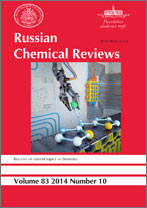|
This article is cited in 11 scientific papers (total in 11 papers)
Active Centres in the Polymerisation of Hydrocarbon Monomers by Anionic Coordination
S. S. Medvedev
Karpov Institute of Physical Chemistry, Moscow
Abstract:
Several aspects are discussed of the nature and character of the active centres in the polymerisation of diene hydrocarbons (mainly butadiene) initiated by organic compounds of alkali metals or by cobalt and nickel complexes. Such polymerisations occur by a complicated mechanism of anionic coordination, characterised by the presence of active centres in the form of polarised bonds between carbon and metal atoms (the alkali metals and the transition metals in the complexes). The coordinating and anionic functions of the active centres, their combination, and mututal transitions are discussed for the polymerisation of butadiene and other hydrocarbon monomers in the presence of organic compounds of alkali metals.
The Section on polymerisation initiated by complex cobalt catalysts reports research on the role of small amounts of water in the formation and breakdown of the initial active centres. The last Section examines the formation of active centres from complexes of the π-allylnickel halide type and the mechanism of their participation in the polymerisation of butadiene. 69 references.
Citation:
S. S. Medvedev, “Active Centres in the Polymerisation of Hydrocarbon Monomers by Anionic Coordination”, Usp. Khim., 37:11 (1968), 1923–1945; Russian Chem. Reviews, 37:11 (1968), 834–845
Linking options:
https://www.mathnet.ru/eng/rcr2219https://doi.org/10.1070/RC1968v037n11ABEH001708 https://www.mathnet.ru/eng/rcr/v37/i11/p1923
|


| Statistics & downloads: |
| Abstract page: | 103 |
|





 Contact us:
Contact us: Terms of Use
Terms of Use
 Registration to the website
Registration to the website Logotypes
Logotypes









